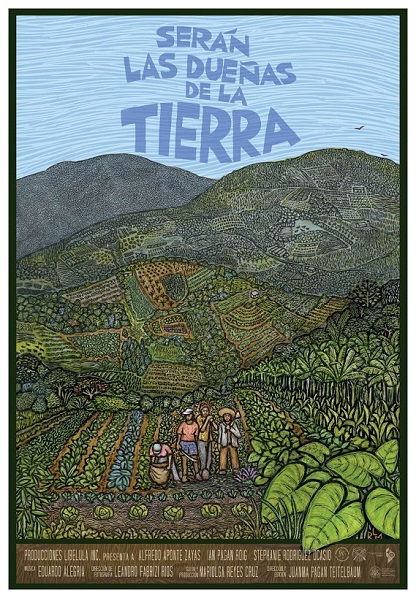Néstor David Pastor reviews Serán las dueñas de la tierra (2022)—a new documentary directed by Juan Manuel (JuanMa) Pagán Teitelbaum—which highlights the many difficulties facing an emerging generation of young farmers in Puerto Rico. The film will be screened in select theaters in Puerto Rico starting on July 14. Here are excerpts; read the full article at NACLA. [Many thanks to director Sonia Fritz for bringing this item to our attention.]
When you consider Puerto Rico’s fertile land and tropical climate, it’s tempting to assume that conditions are ideal for farming—they’re not. This unfortunate reality becomes increasingly apparent in the new documentary, Serán las dueñas de la tierra (English title: Stewards of the Land), which follows the struggles of three young farmers. The film also marks the debut for director Juan Manuel Pagán Teitelbaum, who produced the feature-length documentary alongside his partner, Mariolga Reyes Cruz.
Pagán’s involvement in Puerto Rico’s relatively nascent agriculture movement dates back to his return to the island. Pagán’s involvement in Puerto Rico’s relatively nascent agriculture movement dates back to his return to the island. After completing graduate studies at SUNY Buffalo in 2008, he spent a few years living on a family farm in Utuado, where he began producing short videos on farming. Eventually, the U.S. Department of Agriculture provided funding for 10 short films on basic farming techniques. From there, WIPR, the island’s public television station, became interested in the project and commissioned Pagán and his wife to produce a series of 20 short educational films called Cosecha Hoy. This was a turning point, according to Pagán: “If you spoke to people working in agriculture, they would tell you there was a before and after, simply because [the series] gave visibility to a group of young farmers working in agriculture.”
Those videos were meant to be inspirational, he added. And to the extent that farm income, the amount of cuerdas of land under cultivation, and farming jobs all increased in the previous decade, inspiration abounds.
His next project, however, would seek to balance perspectives by addressing the food system in Puerto Rico, where over 80 percent of the food is imported and a third of residents suffer food insecurity. In conveying this stark reality, the film intentionally adopts a direct cinema style over the course of three years “to let things happen and film them,” explains Pagán.
A long overhead shot of the verdant countryside opens the film before we are introduced to Stephanie Rodríguez, a public school teacher who gives classes on agriculture, in addition to working on two farms in Ciales and Orocovis. The camera lingers on various scenes from Rodriguez’s strenuous daily routine as she narrates her experience.
At one point, she mentions an opportunity to take over a family farm. Though it will become more obvious later in the film, this is a much cheaper and more desirable arrangement than if she were to rent land from Puerto Rico’s Land Authority, the bureaucratic government entity charged with administering the majority of the island’s publicly owned land for agricultural use or other purposes.
[. . .] Next, we meet Alfredo Aponte Zayas, who is returning to Puerto Rico with his family after completing his graduate studies in the United States. Aponte first appears in snowy North Dakota via cell phone footage before an emotional reunion with family members at the airport in San Juan. Symbolically, it is very meaningful to see a young Puerto Rican family return home at a time when hundreds of thousands have been forced to leave, especially with the explicit purpose of returning to the land. Later in the film, during a class, one young woman explains that there is an opportunity to build a new society through this movement, with food sovereignty and agroecology at the forefront. [. . .]
“What these young farmers are going through is so immense…these are the young superstars who want to build up the country,” says Pagán. And it’s not just farmers, he adds, but also teachers, artists, really anyone who is committed to improving material conditions on the island. “Look at how we’re treating them as a society.”
[. . .] The film is able to convey many of these historical and political factors without a surplus of context. It is simply a lived reality for each of the protagonists and a testament to their decision to pursue agriculture. “You don’t have to talk about politics in a film where you have people going against the grain,” says Pagán, “because almost no one decides to study farming in order to be a farmer in the mountains.”
[. . .] Eschewing resilience as a trope, Serán las dueñas de la tierra approaches its subject matter with dignified candor in the face of impossible circumstances. [. . .]
[Néstor David Pastor is a writer, editor, and translator born and raised in Queens, NY. He is the co-founder of huellas, a digital magazine of longform writing by emerging writers with roots in Abya Yala, and editor of Intervenxions, a digital publication of the Latinx Project at NYU that focuses on Latinx arts, culture, and politics. For more information, visit www.ndpastor.com.]
For full article, see https://nacla.org/seran-las-duenas-de-la-tierra-documentary-review


One thought on “Film: “Serán las dueñas de la tierra” (Review)”